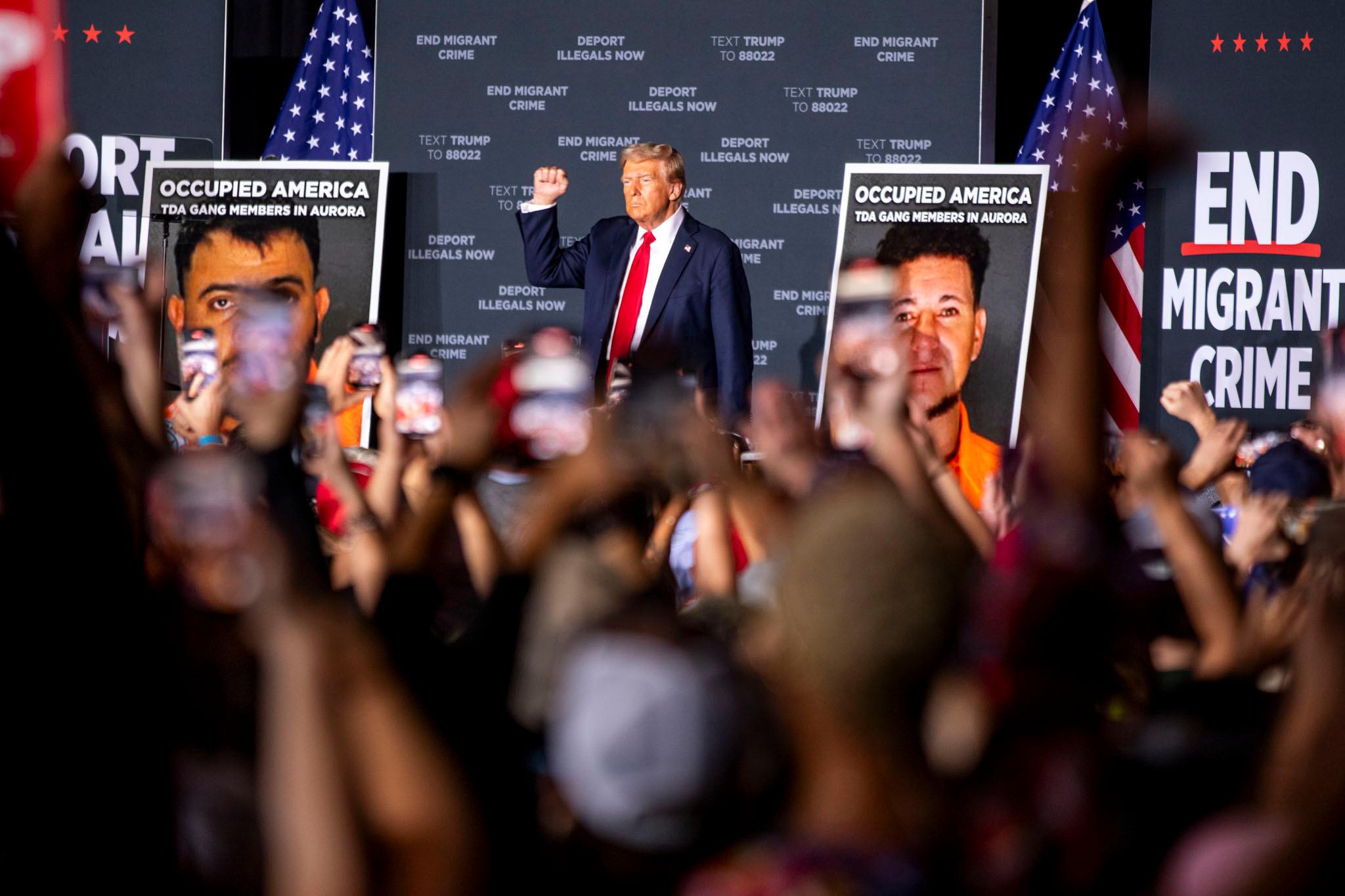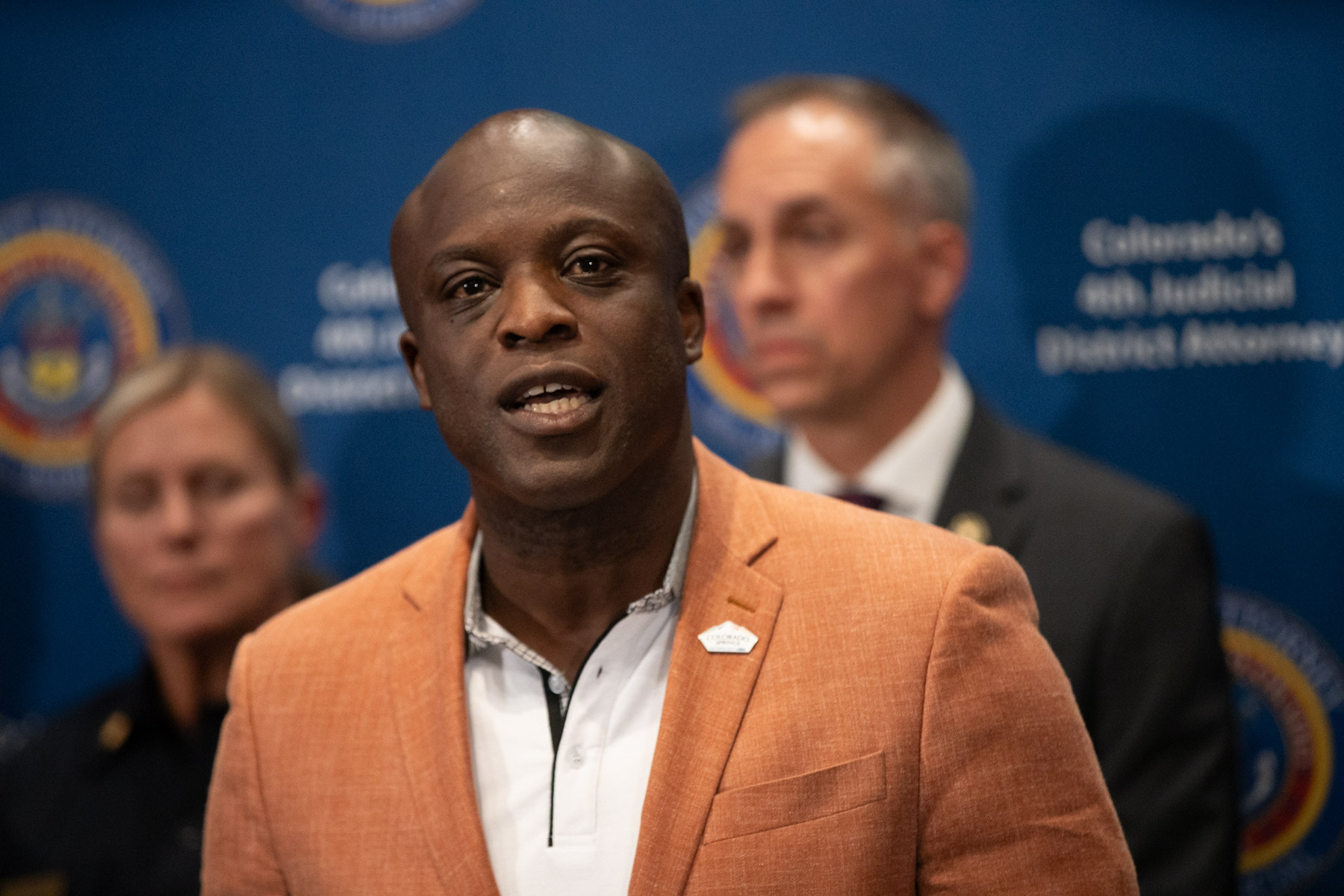
Yemi Mobolade surprised Coloradans and the entire country when he was elected mayor of Colorado Springs earlier this year. Mobolade is politically unaffiliated; before him, the city had only chosen Republican mayors since it started letting the public vote for the position in 1979. Mobolade is also an immigrant, and the first Black person elected mayor of Colorado Springs.
Mobolade’s unlikely political ascension is the latest turn in a remarkable life that brought him from Nigeria to Indiana, where he struggled as a college student, and then to Colorado, where he came to work with a church.
The mayor spoke with Colorado Matters about his life living in two different cultures, how it informs his leadership in Colorado Springs, and why he chose to share a painful personal memory in a recent public speech.
This transcript has been edited for length and clarity.
Colorado Matters: What was life like for you growing up in Lagos, Nigeria? When you think back on that time, what do you remember?
Yemi Mobolade: I don't have a ton of childhood memories, and some psychologists would say that it's connected to childhood trauma. So maybe I am a product of trauma, like most of us.
I grew up in Yoruba culture. I grew up in a community that's very community- and family-centric. You were literally raised by a village. Your neighbors were pseudo-parents to you. It's communal instead of individualistic. Decisions were made in the context of family. That’s how we ended up in the U.S.
Yet I was this young child that was fighting for individuality, for independence. I was a kid that would always ask the “why.” And I see that in my six-year-old daughter. It’s fascinating. She's always curious, and wants to know why. She's not satisfied with the way things are.
I was always asking the big questions early on, even questions like: What’s the meaning of life? Is there a God? I asked questions about the way we grew up; challenged some of the cultural norms around my upbringing.
But in the culture I grew up in, that was not welcomed. It was an adult’s world, and a man’s world. I remember I got in trouble a lot, because I challenged the status quo.
Colorado Matters: Your father worked for Mobil (now ExxonMobil) for a time. How did your father’s work for a multinational U.S. company affect you growing up?
Yemi Mobolade: It meant that he was always gone. He was busy working, so I didn’t grow up with dad being around. That was normal in the culture. And my dad and I butted heads — that is part of my painful childhood stories. Now my relationship is a lot better with my dad.
But on the positive side, his work at Mobil truly changed the trajectory of our lives and his siblings’ lives, because his dad died when he was 13 years old. My parents both grew up in polygamous homes, which was very normal at the time. My dad grew up in rural Nigeria, he was the first boy, and when his dad passed away, he was 13 years old and he instantly became the provider.
So he dropped out of school to help provide for his family. After two years of not being in school, a couple of British teachers convinced his mom to put him back in school, and he ended up having an opportunity to go to college. This is why I’m big on education. He finished college and had the opportunity to work at Mobil, and that created an opportunity to not only improve our quality of life as kids, but he was able to send his siblings to school, as well.
He became an entrepreneur after that. He got into education, he dabbled in transportation, he dabbled in a restaurant, and that closed. Both my parents were also pastors. In the world I grew up in, you were never a full-time pastor. You always had a job and then you pastored on the side.
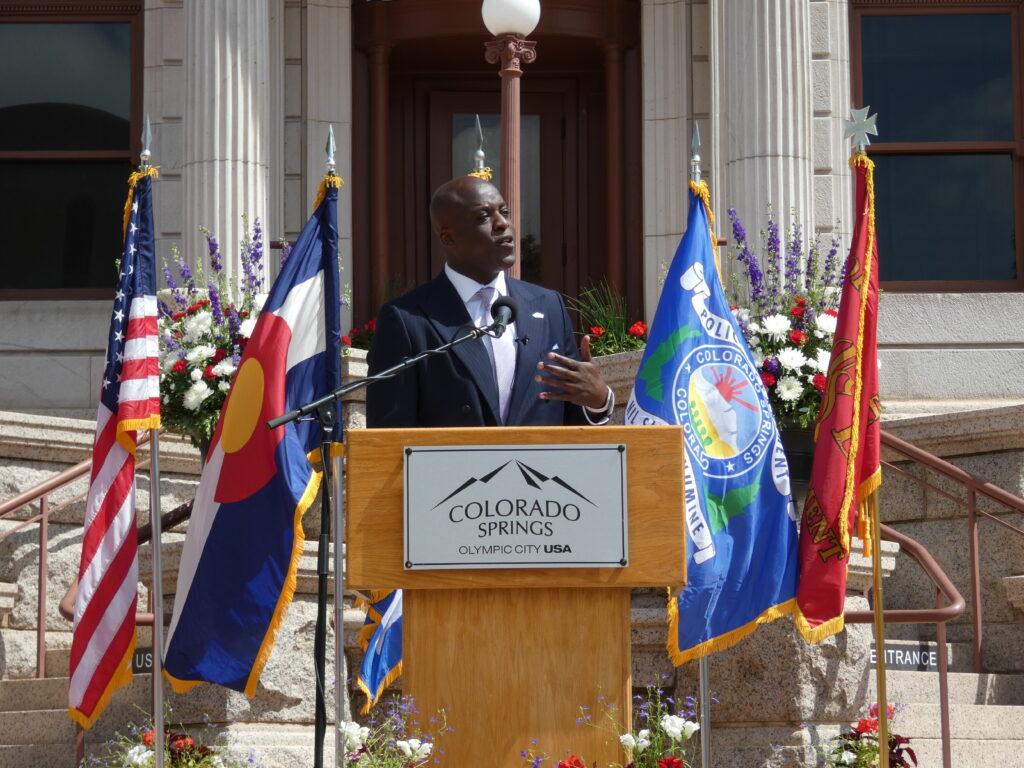
Colorado Matters: Religion became a big part of your own story here in Colorado. Were you religious as a child?
Yemi Mobolade: Initially I was religious and faith was important to me because that's what I grew up in. And I have to give my parents credit: One of the things they did well was they made faith an active part of our lives. We went to church. We did a lot of church activities, and I kind of fought that growing up! But my parents also practiced generosity. They were very generous, very open, and they were always helping people. So I saw faith in action. That was more transformative. That was truly religion and faith in action.
When people were hurting and suffering, they would give generously from their own money. When family members, or even friends’ kids, needed a place to stay, when people left their village to come to the city, my parents would embrace those kids as their own and wouldn't treat them any differently than us. So there were people constantly in and out of our home.
But when I came to the U.S., I kind of struggled with my faith. I almost walked away from all of it, but that season also became transformative for me. Eventually it clicked, where I knew the best of faith was how we loved and treated others. And that fuels how I lead and do politics.
Colorado Matters: In September, in your State of the City Address, you briefly spoke publicly about challenges you had when you were 17. You said, “Most people see my success story… but buried in that story is a 17-year-old kid who came into this country lost, lonely and struggling.” Why did you want to share that?
Yemi Mobolade: I feel like to whom much is given, much is required, and I'm in a privileged position now to help others. It's easy for people to see successes and not realize that behind every story there's a story of challenge and pain. And so mental health is really important to my wife and to me. It's close to our household. So it was a unique opportunity for me to be vulnerable and for me to be relatable and for people to know that most of us are dealing with this.
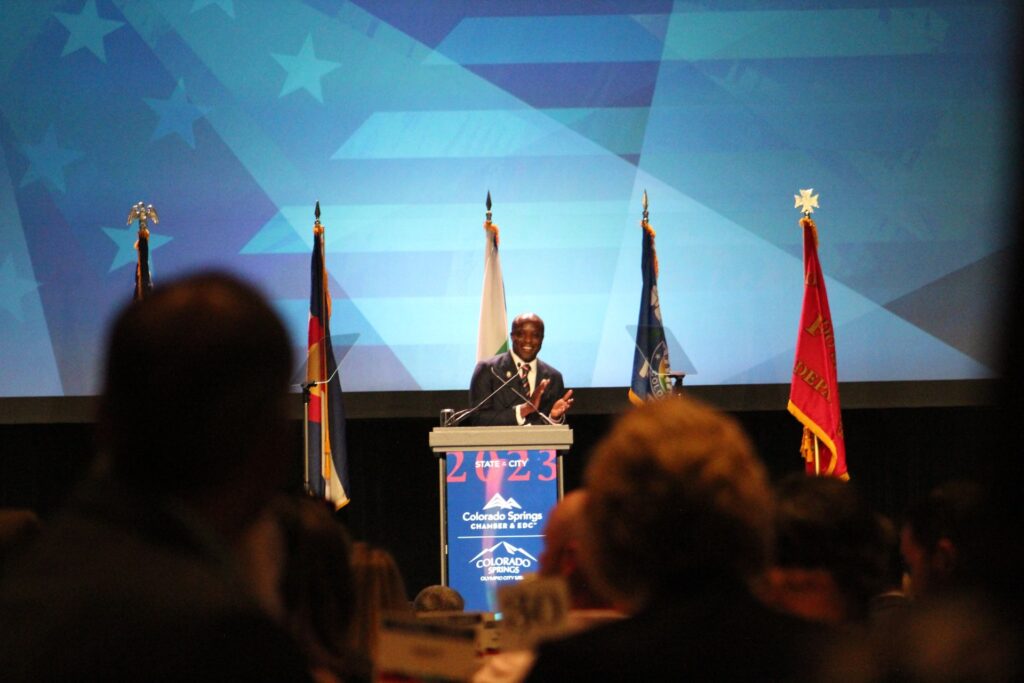
As a young kid in Nigeria, I had suicidal thoughts. I wanted to run away. I was also lonely and struggling my first few years in Indiana. I had poor grades. I didn't have friends. People look at me now and see that I’m friendly and people want to be around me, but that’s not how I started. I didn't know who I was. It wasn't until my junior year when everything began to change.
So I want people to know that there's hope. Hopefully someone heard that speech and felt hopeful that they're not alone, to move us from isolation into community. That's the goal, and that's why I shared that. I have a platform. I have a bully pulpit. I have a megaphone. So I intend to use it for all the right reasons.
Colorado Matters: How did you turn things around?
Yemi Mobolade: It was my junior year when I finally found the real Yemi. This is why I'm big on mentoring, and neighborhood engagement, and bringing people into community. Some key people in my life were able to see me, and speak life and truth into me, and that made the difference for me.
I remember the few people that took time to get to know this immigrant kid. Brandi Miller will forever have a special place in my heart. She was a senior in college at Bethel. At a time in student life where you’re having senioritis and kind of checking out, she was so plugged in and engaged. I remember her seeking me out. I had a very thick accent. Most people at that time in the Midwest didn’t know how to relate to me. Brandi came and gave me friendship. It made me feel like a million bucks.
It started with her, then it was a staff person, then a professor, then a person named Vicky Garrett. She was an artist in residence at the college. I signed up for voice lessons with her. There were key moments when she would stop and look at me and say, “There’s something special about you. You’re going to do something great with your life.”
When I was deciding whether to run for mayor, I went back to Indiana, and I asked Vicky to tell me what she’d seen in me. She spoke the same truth to me. By the time I got back to Colorado Springs, she called me and said, “I have a check waiting for you.”
This is why I shared the story in my State of the City address: We can be the next Vicky to the next immigrant, the next refugee, the next young person that is unsure, that is feeling lost, lonely, is isolated, that had trauma from childhood. It’s okay to call out things in people that they don’t see in themselves at the time.
Colorado Matters: Since you shared a glimpse into this story in your public address, have you heard from residents who want to connect with you about it?
Yemi Mobolade: The word that we keep hearing from everyone is “inspired.” Now inspiration has led to action: We have a goal of a thousand block parties in 2024 to move people from social isolation to community.
The pandemic and the events of 2020 really shined a light on a cancer we've had as a culture. The very thing we love with technology is also really hurting us. Part of that is the unintended consequence of what I love about our culture: Part of the American way is the ability to pull yourself up, the ability to make your own way. You can do anything. We're a nation of individuals who are trying to advance our society. While that’s good, the flip side is that we're also suffering as individuals.
It’s in contrast to many developing countries, where, because of the economic situation, you need to depend on others. Most of us in the U.S. don't have to depend on others. We get to buy our own isolation. I have the ability to buy everything I need, even if I buy secondhand. So I don't need to go to my neighbor to ask for anything.
As mayor, I'm trying to push back that barrier. While we may not need to ask for help, let's choose to, because of the benefits to our mental psyche.
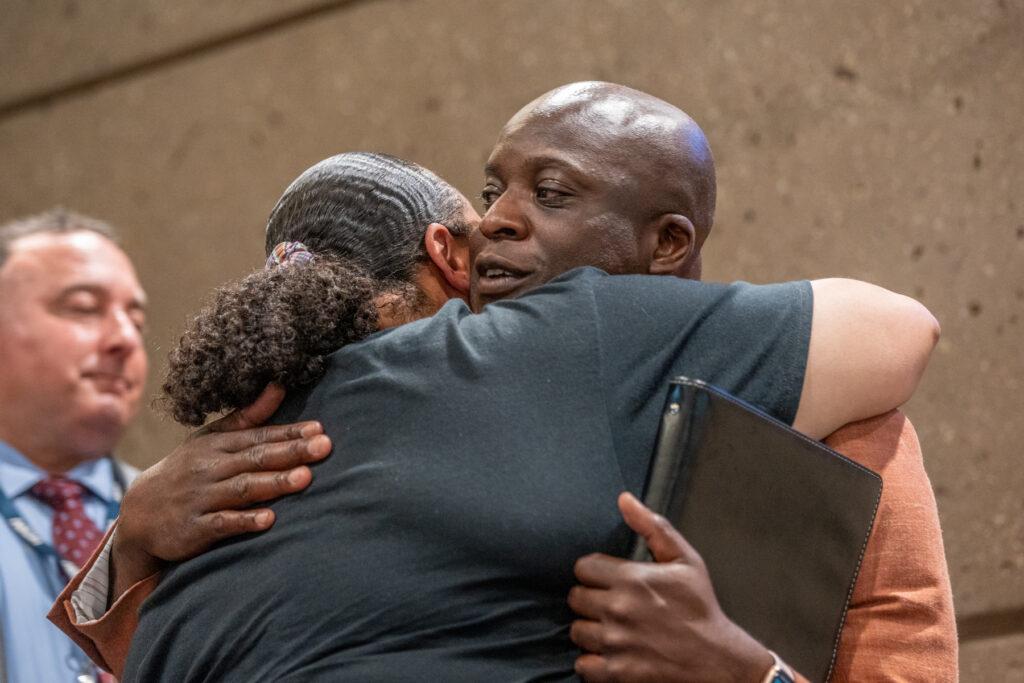
Colorado Matters: It sounds like your policy initiative, to create block parties, is informed by your upbringing.
Yemi Mobolade: Completely. Even from a faith perspective, it was a contrast for me, growing up in a Nigerian faith tradition, to come to the U.S. and hear the language about a personal relationship to faith.
I have the wonderful privilege of living my life with these two worldviews. I'm more American than anything else. I've lived in this country now for 28 years, and I'm a proud American. I do love this country. But my roots have been shaped by a different part of the world, being West African. And I carry those two lenses into almost everything I do, and every decision.
So the opportunity I see around neighborhood engagement comes from my own experience and my upbringing, but also it puts into practice what I saw as a pastor. We did the things that I'm trying to promote, and it was transformative. We encouraged the folks in our church to host block parties and get to know their neighbors. And part of being great neighbors is the art of receiving. So you give the other person the power to help you.
Colorado Matters: In the early 2000s, when you graduated college, did you think you would be mayor of Colorado Springs 20 years later?
Yemi Mobolade: Not even close. But I was committed to making a difference. When you’re committed to making a difference and leaving the world better than you found it, that path can take you in all kinds of directions that you weren’t intending.
The two most significant days of one’s life are the day you were born and the day you know why you were born. When you know your “why,” you can do anything. Part of that for me today is recognizing that politics needs to be disrupted. We need good leadership, we need sound leadership, we need objective and inclusive leadership.
Colorado Matters: How did you come to Colorado Springs?
Yemi Mobolade: When I was almost 30, I went through a faith crisis, a relationship crisis, health issues. I’m blessed with three autoimmune diseases. I actually embrace it. I’m weird, I know. I embrace pain. It’s part of the journey. It keeps us humble, it keeps us grounded as leaders, and I have the ability to better empathize with people.
So at almost 30, that season of pain is what gave me the courage to do something I’ve always wanted to do. I’ve always wanted to move out west, to be by the mountains, outdoors. And I wanted to lead change. I didn’t want to just complain about the state of the world and complain about the business.
Colorado Matters: The evangelical organization that you founded a church with, the Christian and Ministry Alliance, moved its headquarters out of Colorado Springs a few years ago. They said it was because the cost of living here had become too high. When they left the city, did that give you any pause?
Yemi Mobolade: It’s still concerning. We’re a city of nonprofits, and when they cited that as the reason they left, they said they couldn’t attract talent, and couldn’t pay them enough to live in this city. It’s one of the reasons I’m so passionate about addressing our affordability issues and our housing issues, because the impact is great.
I fear we might see more organizations do what the CMA did. I hope that’s not the case. We still have a chance to get ahead of it, to remedy this problem, but we need to pay attention to the reason why the CMA left Colorado Springs. It’s not because they wanted to leave.
Colorado Matters: You became a naturalized citizen in 2017. When you were elected in 2023, Good Morning America said you had lived the American Dream. But you’ve said in interviews that the American Dream is further out of reach of some people in Colorado Springs. How much can you do, as a mayor specifically, to turn the tide and give more people a shot?
Yemi Mobolade: It starts with a mayor who started out as a West African immigrant, became a citizen only six years ago, and now is a mayor of the 39th largest city. It starts with the face of the city and how that brings about hope.
My story and this story of Colorado Springs have become a global story. A number of African and immigrant leaders, and cultural leaders, have reached out to me, who are now inspired to do things that they thought they could never do.
We have the ability to increase access, help people’s mental health, our emotional health, and let them see what’s possible. Two young African-American men in Colorado Springs looked at me after the win and said, “The sky's a limit.” And I said, “That's exactly true.”
I'm now meeting Nigerians and Africans in our city and all over the state. To watch the excitement and inspiration, and to see people come in to visit Colorado Springs from Houston, Texas, they all want to meet me at the mayor's office. They don’t want to meet in a cafe, or in my business. They want to come to the mayor's office. That's a big deal.
Colorado Matters: Do you see yourself holding statewide or national office to extend the reach of that message?
Yemi Mobolade: I said no to running for mayor, so I probably shouldn’t say no. But I still dislike politics. That hasn’t changed. I entered this journey wanting to serve my community for a season, and give back to the land and the city and the country that helped make me. But I never got into this journey to make it a career path.
But, I said no once, and if I keep saying no, then it’s going to happen.
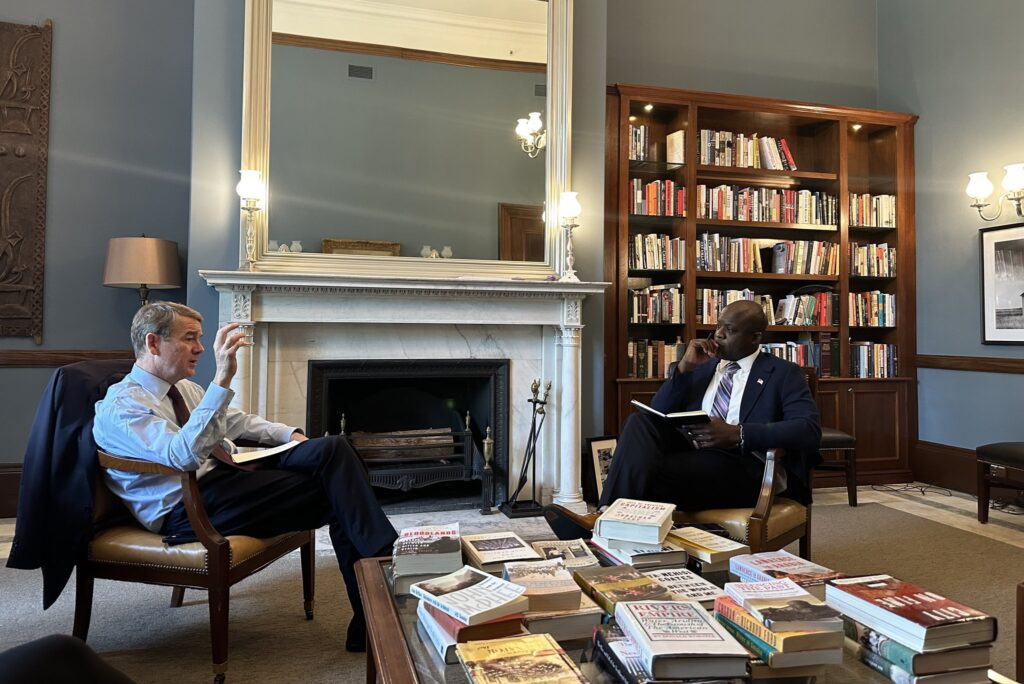
Colorado Matters: What do you want people to know about your experience with the legal process of becoming a naturalized U.S. citizen?
Yemi Mobolade: The immigration process is a long, arduous and expensive journey. I was lucky to have people and employers who were willing to take a chance on me, and it still took 21 years…
Understanding the hurdles faced by immigrants including legal complexities can help inform the right policies and community initiatives to support immigrants, like me, who have consistently contributed to the growth and development of the United States.
Related coverage
- Political newcomer Yemi Mobolade wins Colorado Springs mayor’s race
- Mayor-elect Yemi Mobolade talks priorities as he readies to take the helm of Colorado’s second-largest city
- Colorado Springs’ new mayor appears in unity ad with candidate he beat
- Mobolade to prioritize public engagement, funding for new police training academy as mayor of Colorado Springs
- Colorado Springs Mayor Yemi Mobolade wraps up a whirlwind DC trip
- ‘I am listening’: Colorado Springs Mayor Mobolade focuses on community in first State of the City address
- Mayor Mobolade proposes a $428 million budget for Colorado Springs in 2024. Here’s where the money would go







